Comprehensive Report on Entrepreneurial Ventures and Social Economy
VerifiedAdded on 2023/01/18
|15
|2737
|51
Report
AI Summary
This report provides an in-depth analysis of entrepreneurial ventures, exploring their various types, including social, corporate, and public enterprises, and their relationships to typologies like sole proprietorships and partnerships. The report examines the similarities and differences between these ventures, focusing on aspects such as their aims, risk profiles, size, and structure. It also presents relevant data and statistics illustrating the significant impact of small and micro businesses on the social economy, highlighting their contributions to employment and turnover. Furthermore, the report emphasizes the importance of startups and small businesses in fostering the growth of the social economy, detailing their roles in employment generation, improving living standards, and driving innovation. The report also contrasts the characteristic traits and skills of successful entrepreneurs with those of traditional businessmen and analyzes how entrepreneurial personalities influence motivation and mindset. Finally, the report explores how the background and experience of successful entrepreneurs, such as Steve Jobs and Peter Jones, can both hinder and foster their entrepreneurial journeys, offering valuable insights into the factors that contribute to their success.

Assessment
Paraphrase This Document
Need a fresh take? Get an instant paraphrase of this document with our AI Paraphraser
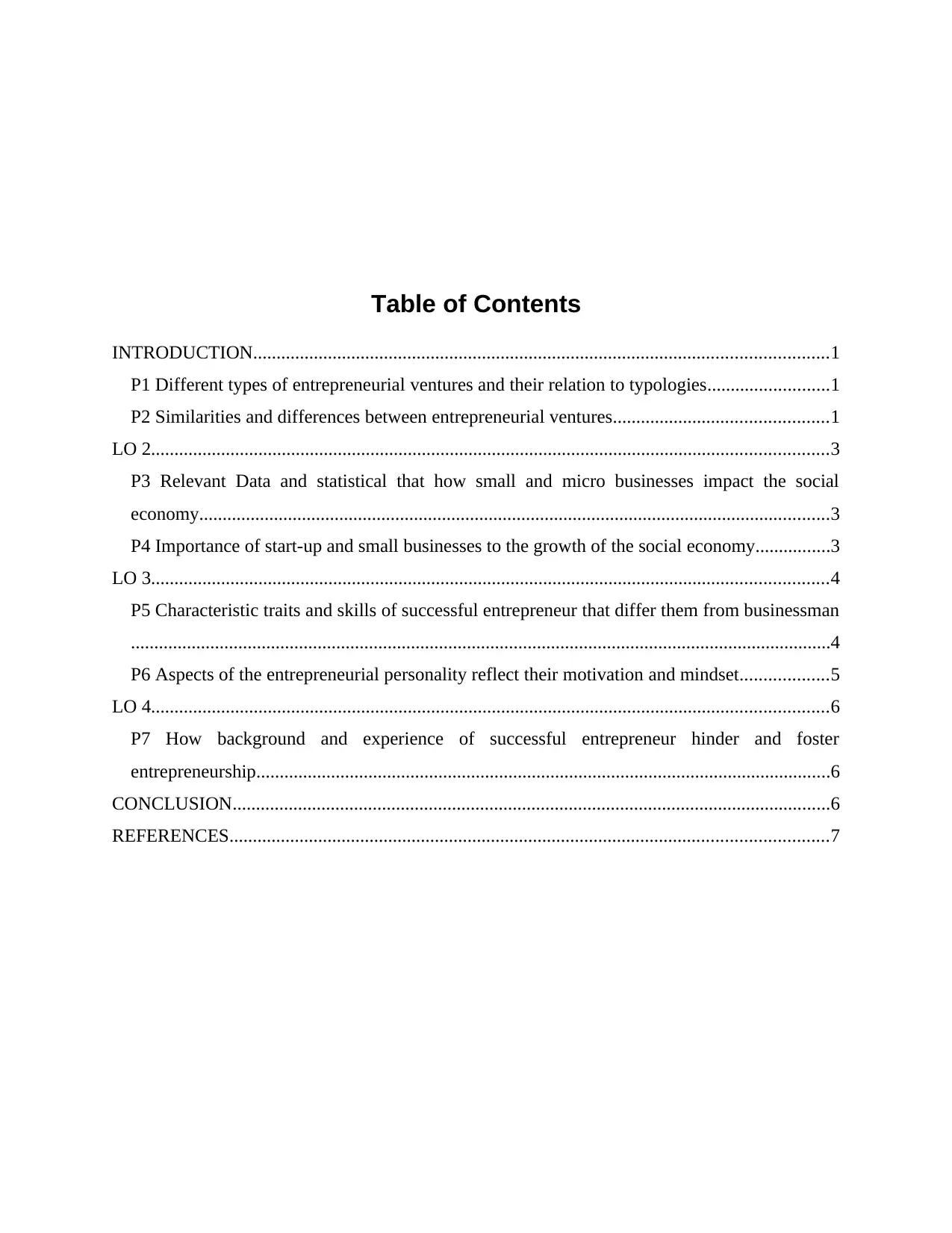
Table of Contents
INTRODUCTION...........................................................................................................................1
P1 Different types of entrepreneurial ventures and their relation to typologies..........................1
P2 Similarities and differences between entrepreneurial ventures..............................................1
LO 2.................................................................................................................................................3
P3 Relevant Data and statistical that how small and micro businesses impact the social
economy.......................................................................................................................................3
P4 Importance of start-up and small businesses to the growth of the social economy................3
LO 3.................................................................................................................................................4
P5 Characteristic traits and skills of successful entrepreneur that differ them from businessman
......................................................................................................................................................4
P6 Aspects of the entrepreneurial personality reflect their motivation and mindset...................5
LO 4.................................................................................................................................................6
P7 How background and experience of successful entrepreneur hinder and foster
entrepreneurship...........................................................................................................................6
CONCLUSION................................................................................................................................6
REFERENCES................................................................................................................................7
INTRODUCTION...........................................................................................................................1
P1 Different types of entrepreneurial ventures and their relation to typologies..........................1
P2 Similarities and differences between entrepreneurial ventures..............................................1
LO 2.................................................................................................................................................3
P3 Relevant Data and statistical that how small and micro businesses impact the social
economy.......................................................................................................................................3
P4 Importance of start-up and small businesses to the growth of the social economy................3
LO 3.................................................................................................................................................4
P5 Characteristic traits and skills of successful entrepreneur that differ them from businessman
......................................................................................................................................................4
P6 Aspects of the entrepreneurial personality reflect their motivation and mindset...................5
LO 4.................................................................................................................................................6
P7 How background and experience of successful entrepreneur hinder and foster
entrepreneurship...........................................................................................................................6
CONCLUSION................................................................................................................................6
REFERENCES................................................................................................................................7
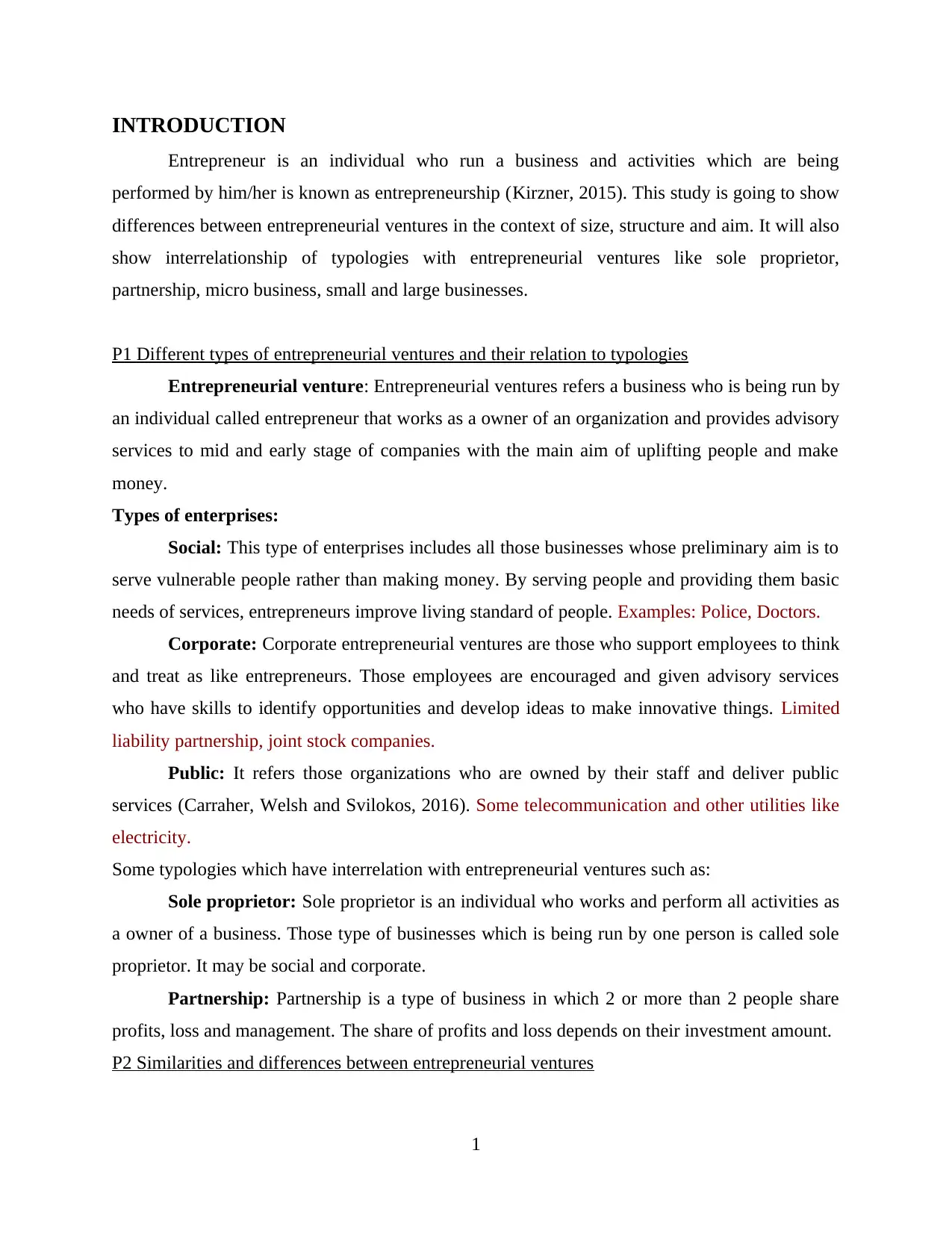
INTRODUCTION
Entrepreneur is an individual who run a business and activities which are being
performed by him/her is known as entrepreneurship (Kirzner, 2015). This study is going to show
differences between entrepreneurial ventures in the context of size, structure and aim. It will also
show interrelationship of typologies with entrepreneurial ventures like sole proprietor,
partnership, micro business, small and large businesses.
P1 Different types of entrepreneurial ventures and their relation to typologies
Entrepreneurial venture: Entrepreneurial ventures refers a business who is being run by
an individual called entrepreneur that works as a owner of an organization and provides advisory
services to mid and early stage of companies with the main aim of uplifting people and make
money.
Types of enterprises:
Social: This type of enterprises includes all those businesses whose preliminary aim is to
serve vulnerable people rather than making money. By serving people and providing them basic
needs of services, entrepreneurs improve living standard of people. Examples: Police, Doctors.
Corporate: Corporate entrepreneurial ventures are those who support employees to think
and treat as like entrepreneurs. Those employees are encouraged and given advisory services
who have skills to identify opportunities and develop ideas to make innovative things. Limited
liability partnership, joint stock companies.
Public: It refers those organizations who are owned by their staff and deliver public
services (Carraher, Welsh and Svilokos, 2016). Some telecommunication and other utilities like
electricity.
Some typologies which have interrelation with entrepreneurial ventures such as:
Sole proprietor: Sole proprietor is an individual who works and perform all activities as
a owner of a business. Those type of businesses which is being run by one person is called sole
proprietor. It may be social and corporate.
Partnership: Partnership is a type of business in which 2 or more than 2 people share
profits, loss and management. The share of profits and loss depends on their investment amount.
P2 Similarities and differences between entrepreneurial ventures
1
Entrepreneur is an individual who run a business and activities which are being
performed by him/her is known as entrepreneurship (Kirzner, 2015). This study is going to show
differences between entrepreneurial ventures in the context of size, structure and aim. It will also
show interrelationship of typologies with entrepreneurial ventures like sole proprietor,
partnership, micro business, small and large businesses.
P1 Different types of entrepreneurial ventures and their relation to typologies
Entrepreneurial venture: Entrepreneurial ventures refers a business who is being run by
an individual called entrepreneur that works as a owner of an organization and provides advisory
services to mid and early stage of companies with the main aim of uplifting people and make
money.
Types of enterprises:
Social: This type of enterprises includes all those businesses whose preliminary aim is to
serve vulnerable people rather than making money. By serving people and providing them basic
needs of services, entrepreneurs improve living standard of people. Examples: Police, Doctors.
Corporate: Corporate entrepreneurial ventures are those who support employees to think
and treat as like entrepreneurs. Those employees are encouraged and given advisory services
who have skills to identify opportunities and develop ideas to make innovative things. Limited
liability partnership, joint stock companies.
Public: It refers those organizations who are owned by their staff and deliver public
services (Carraher, Welsh and Svilokos, 2016). Some telecommunication and other utilities like
electricity.
Some typologies which have interrelation with entrepreneurial ventures such as:
Sole proprietor: Sole proprietor is an individual who works and perform all activities as
a owner of a business. Those type of businesses which is being run by one person is called sole
proprietor. It may be social and corporate.
Partnership: Partnership is a type of business in which 2 or more than 2 people share
profits, loss and management. The share of profits and loss depends on their investment amount.
P2 Similarities and differences between entrepreneurial ventures
1
⊘ This is a preview!⊘
Do you want full access?
Subscribe today to unlock all pages.

Trusted by 1+ million students worldwide
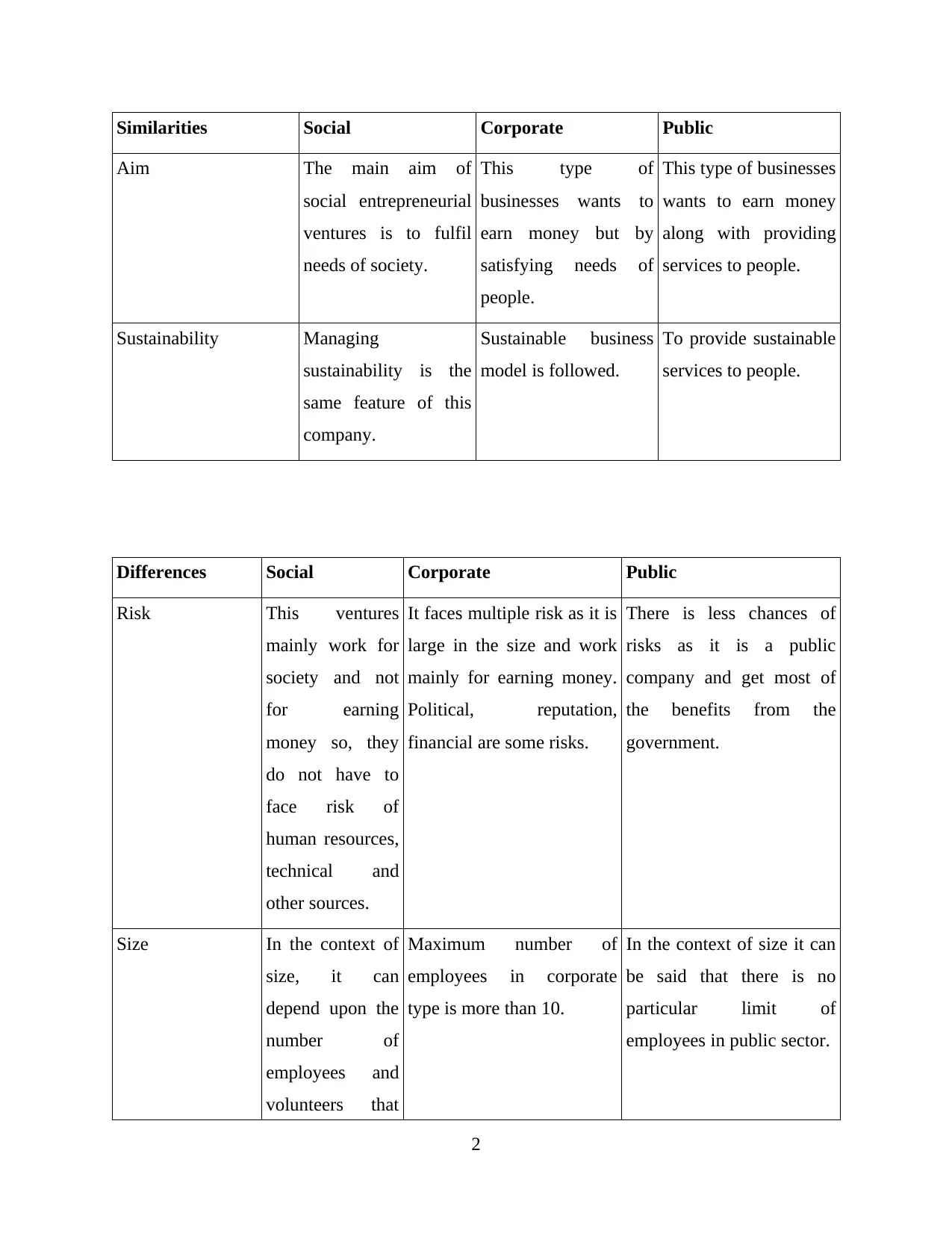
Similarities Social Corporate Public
Aim The main aim of
social entrepreneurial
ventures is to fulfil
needs of society.
This type of
businesses wants to
earn money but by
satisfying needs of
people.
This type of businesses
wants to earn money
along with providing
services to people.
Sustainability Managing
sustainability is the
same feature of this
company.
Sustainable business
model is followed.
To provide sustainable
services to people.
Differences Social Corporate Public
Risk This ventures
mainly work for
society and not
for earning
money so, they
do not have to
face risk of
human resources,
technical and
other sources.
It faces multiple risk as it is
large in the size and work
mainly for earning money.
Political, reputation,
financial are some risks.
There is less chances of
risks as it is a public
company and get most of
the benefits from the
government.
Size In the context of
size, it can
depend upon the
number of
employees and
volunteers that
Maximum number of
employees in corporate
type is more than 10.
In the context of size it can
be said that there is no
particular limit of
employees in public sector.
2
Aim The main aim of
social entrepreneurial
ventures is to fulfil
needs of society.
This type of
businesses wants to
earn money but by
satisfying needs of
people.
This type of businesses
wants to earn money
along with providing
services to people.
Sustainability Managing
sustainability is the
same feature of this
company.
Sustainable business
model is followed.
To provide sustainable
services to people.
Differences Social Corporate Public
Risk This ventures
mainly work for
society and not
for earning
money so, they
do not have to
face risk of
human resources,
technical and
other sources.
It faces multiple risk as it is
large in the size and work
mainly for earning money.
Political, reputation,
financial are some risks.
There is less chances of
risks as it is a public
company and get most of
the benefits from the
government.
Size In the context of
size, it can
depend upon the
number of
employees and
volunteers that
Maximum number of
employees in corporate
type is more than 10.
In the context of size it can
be said that there is no
particular limit of
employees in public sector.
2
Paraphrase This Document
Need a fresh take? Get an instant paraphrase of this document with our AI Paraphraser
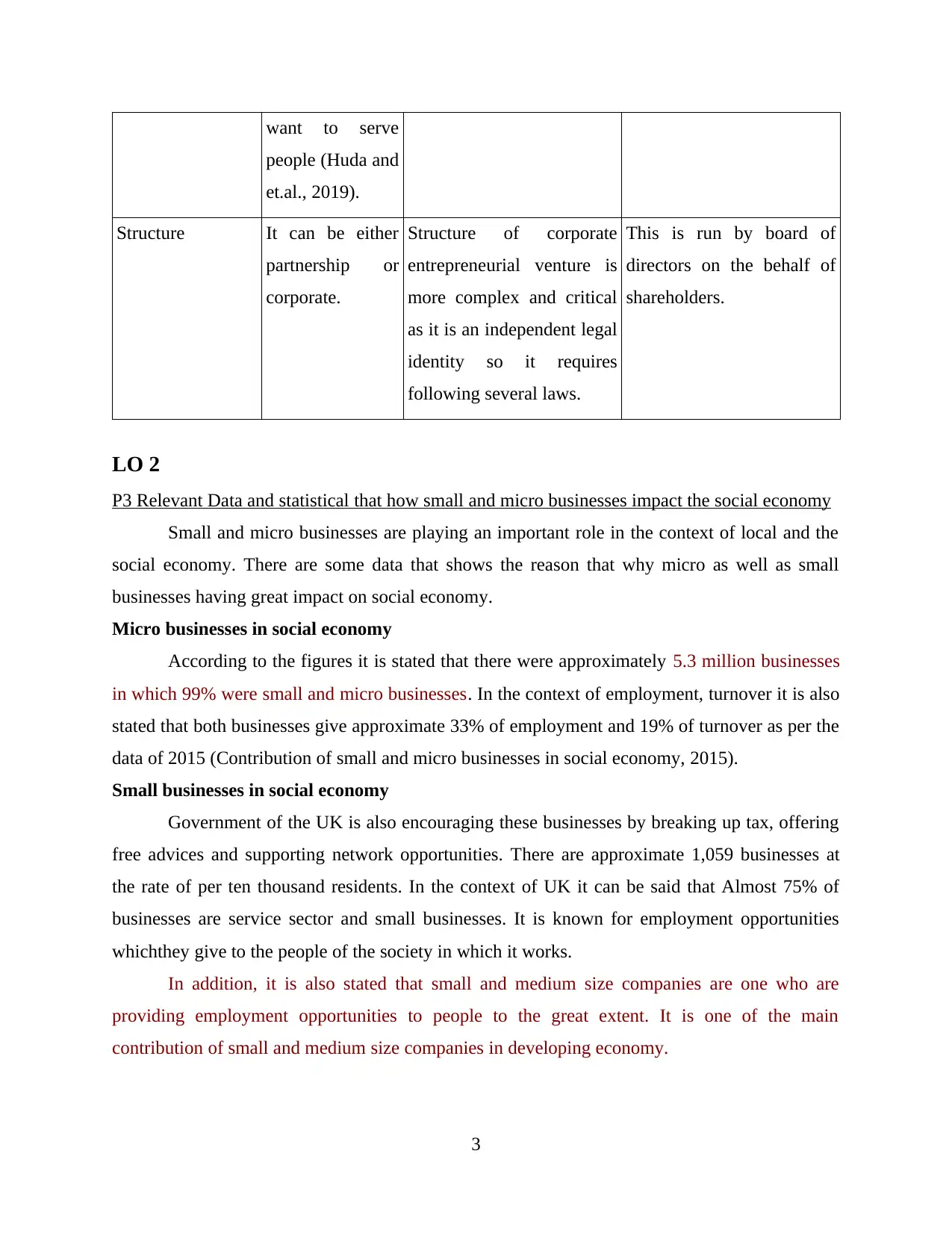
want to serve
people (Huda and
et.al., 2019).
Structure It can be either
partnership or
corporate.
Structure of corporate
entrepreneurial venture is
more complex and critical
as it is an independent legal
identity so it requires
following several laws.
This is run by board of
directors on the behalf of
shareholders.
LO 2
P3 Relevant Data and statistical that how small and micro businesses impact the social economy
Small and micro businesses are playing an important role in the context of local and the
social economy. There are some data that shows the reason that why micro as well as small
businesses having great impact on social economy.
Micro businesses in social economy
According to the figures it is stated that there were approximately 5.3 million businesses
in which 99% were small and micro businesses. In the context of employment, turnover it is also
stated that both businesses give approximate 33% of employment and 19% of turnover as per the
data of 2015 (Contribution of small and micro businesses in social economy, 2015).
Small businesses in social economy
Government of the UK is also encouraging these businesses by breaking up tax, offering
free advices and supporting network opportunities. There are approximate 1,059 businesses at
the rate of per ten thousand residents. In the context of UK it can be said that Almost 75% of
businesses are service sector and small businesses. It is known for employment opportunities
whichthey give to the people of the society in which it works.
In addition, it is also stated that small and medium size companies are one who are
providing employment opportunities to people to the great extent. It is one of the main
contribution of small and medium size companies in developing economy.
3
people (Huda and
et.al., 2019).
Structure It can be either
partnership or
corporate.
Structure of corporate
entrepreneurial venture is
more complex and critical
as it is an independent legal
identity so it requires
following several laws.
This is run by board of
directors on the behalf of
shareholders.
LO 2
P3 Relevant Data and statistical that how small and micro businesses impact the social economy
Small and micro businesses are playing an important role in the context of local and the
social economy. There are some data that shows the reason that why micro as well as small
businesses having great impact on social economy.
Micro businesses in social economy
According to the figures it is stated that there were approximately 5.3 million businesses
in which 99% were small and micro businesses. In the context of employment, turnover it is also
stated that both businesses give approximate 33% of employment and 19% of turnover as per the
data of 2015 (Contribution of small and micro businesses in social economy, 2015).
Small businesses in social economy
Government of the UK is also encouraging these businesses by breaking up tax, offering
free advices and supporting network opportunities. There are approximate 1,059 businesses at
the rate of per ten thousand residents. In the context of UK it can be said that Almost 75% of
businesses are service sector and small businesses. It is known for employment opportunities
whichthey give to the people of the society in which it works.
In addition, it is also stated that small and medium size companies are one who are
providing employment opportunities to people to the great extent. It is one of the main
contribution of small and medium size companies in developing economy.
3
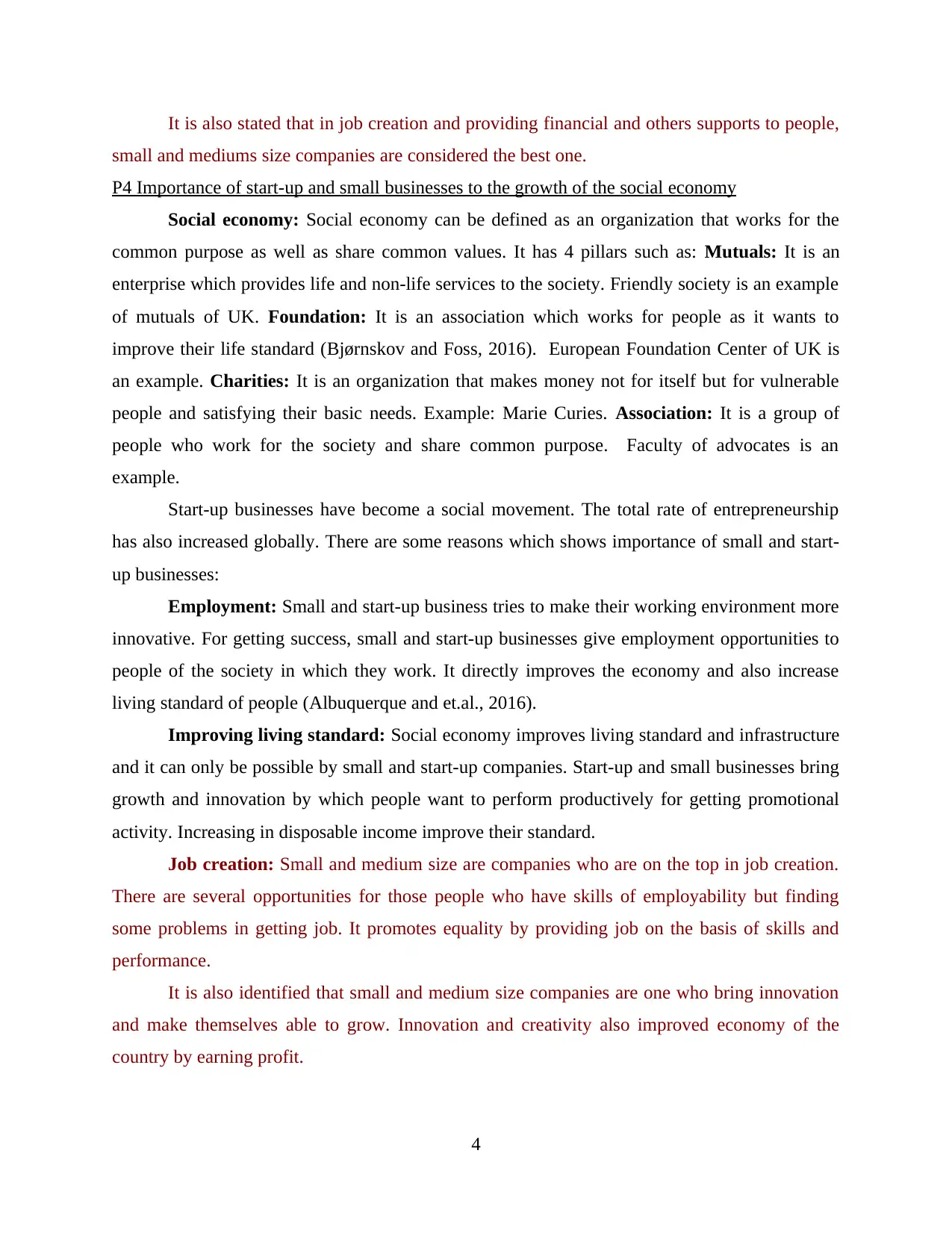
It is also stated that in job creation and providing financial and others supports to people,
small and mediums size companies are considered the best one.
P4 Importance of start-up and small businesses to the growth of the social economy
Social economy: Social economy can be defined as an organization that works for the
common purpose as well as share common values. It has 4 pillars such as: Mutuals: It is an
enterprise which provides life and non-life services to the society. Friendly society is an example
of mutuals of UK. Foundation: It is an association which works for people as it wants to
improve their life standard (Bjørnskov and Foss, 2016). European Foundation Center of UK is
an example. Charities: It is an organization that makes money not for itself but for vulnerable
people and satisfying their basic needs. Example: Marie Curies. Association: It is a group of
people who work for the society and share common purpose. Faculty of advocates is an
example.
Start-up businesses have become a social movement. The total rate of entrepreneurship
has also increased globally. There are some reasons which shows importance of small and start-
up businesses:
Employment: Small and start-up business tries to make their working environment more
innovative. For getting success, small and start-up businesses give employment opportunities to
people of the society in which they work. It directly improves the economy and also increase
living standard of people (Albuquerque and et.al., 2016).
Improving living standard: Social economy improves living standard and infrastructure
and it can only be possible by small and start-up companies. Start-up and small businesses bring
growth and innovation by which people want to perform productively for getting promotional
activity. Increasing in disposable income improve their standard.
Job creation: Small and medium size are companies who are on the top in job creation.
There are several opportunities for those people who have skills of employability but finding
some problems in getting job. It promotes equality by providing job on the basis of skills and
performance.
It is also identified that small and medium size companies are one who bring innovation
and make themselves able to grow. Innovation and creativity also improved economy of the
country by earning profit.
4
small and mediums size companies are considered the best one.
P4 Importance of start-up and small businesses to the growth of the social economy
Social economy: Social economy can be defined as an organization that works for the
common purpose as well as share common values. It has 4 pillars such as: Mutuals: It is an
enterprise which provides life and non-life services to the society. Friendly society is an example
of mutuals of UK. Foundation: It is an association which works for people as it wants to
improve their life standard (Bjørnskov and Foss, 2016). European Foundation Center of UK is
an example. Charities: It is an organization that makes money not for itself but for vulnerable
people and satisfying their basic needs. Example: Marie Curies. Association: It is a group of
people who work for the society and share common purpose. Faculty of advocates is an
example.
Start-up businesses have become a social movement. The total rate of entrepreneurship
has also increased globally. There are some reasons which shows importance of small and start-
up businesses:
Employment: Small and start-up business tries to make their working environment more
innovative. For getting success, small and start-up businesses give employment opportunities to
people of the society in which they work. It directly improves the economy and also increase
living standard of people (Albuquerque and et.al., 2016).
Improving living standard: Social economy improves living standard and infrastructure
and it can only be possible by small and start-up companies. Start-up and small businesses bring
growth and innovation by which people want to perform productively for getting promotional
activity. Increasing in disposable income improve their standard.
Job creation: Small and medium size are companies who are on the top in job creation.
There are several opportunities for those people who have skills of employability but finding
some problems in getting job. It promotes equality by providing job on the basis of skills and
performance.
It is also identified that small and medium size companies are one who bring innovation
and make themselves able to grow. Innovation and creativity also improved economy of the
country by earning profit.
4
⊘ This is a preview!⊘
Do you want full access?
Subscribe today to unlock all pages.

Trusted by 1+ million students worldwide
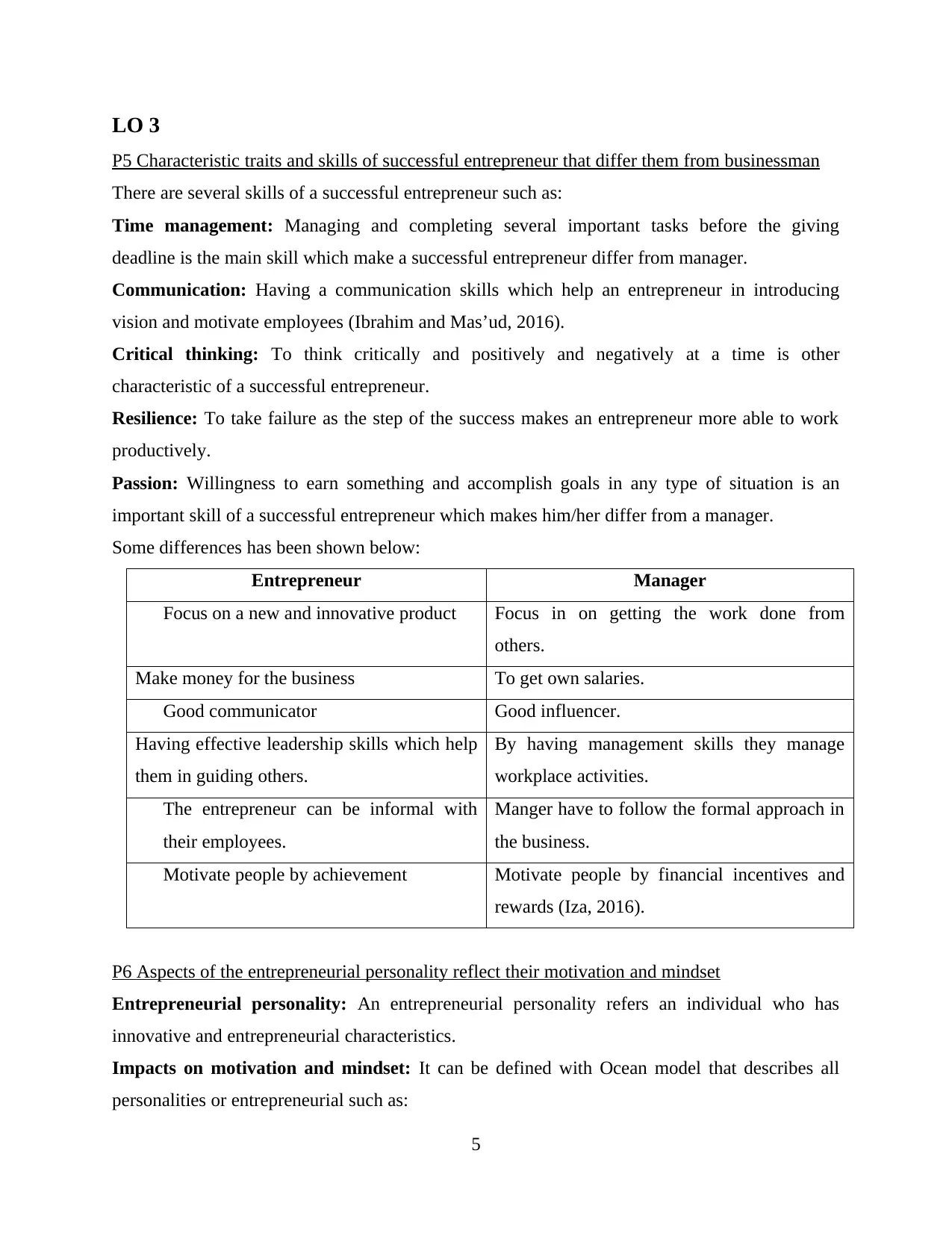
LO 3
P5 Characteristic traits and skills of successful entrepreneur that differ them from businessman
There are several skills of a successful entrepreneur such as:
Time management: Managing and completing several important tasks before the giving
deadline is the main skill which make a successful entrepreneur differ from manager.
Communication: Having a communication skills which help an entrepreneur in introducing
vision and motivate employees (Ibrahim and Mas’ud, 2016).
Critical thinking: To think critically and positively and negatively at a time is other
characteristic of a successful entrepreneur.
Resilience: To take failure as the step of the success makes an entrepreneur more able to work
productively.
Passion: Willingness to earn something and accomplish goals in any type of situation is an
important skill of a successful entrepreneur which makes him/her differ from a manager.
Some differences has been shown below:
Entrepreneur Manager
Focus on a new and innovative product Focus in on getting the work done from
others.
Make money for the business To get own salaries.
Good communicator Good influencer.
Having effective leadership skills which help
them in guiding others.
By having management skills they manage
workplace activities.
The entrepreneur can be informal with
their employees.
Manger have to follow the formal approach in
the business.
Motivate people by achievement Motivate people by financial incentives and
rewards (Iza, 2016).
P6 Aspects of the entrepreneurial personality reflect their motivation and mindset
Entrepreneurial personality: An entrepreneurial personality refers an individual who has
innovative and entrepreneurial characteristics.
Impacts on motivation and mindset: It can be defined with Ocean model that describes all
personalities or entrepreneurial such as:
5
P5 Characteristic traits and skills of successful entrepreneur that differ them from businessman
There are several skills of a successful entrepreneur such as:
Time management: Managing and completing several important tasks before the giving
deadline is the main skill which make a successful entrepreneur differ from manager.
Communication: Having a communication skills which help an entrepreneur in introducing
vision and motivate employees (Ibrahim and Mas’ud, 2016).
Critical thinking: To think critically and positively and negatively at a time is other
characteristic of a successful entrepreneur.
Resilience: To take failure as the step of the success makes an entrepreneur more able to work
productively.
Passion: Willingness to earn something and accomplish goals in any type of situation is an
important skill of a successful entrepreneur which makes him/her differ from a manager.
Some differences has been shown below:
Entrepreneur Manager
Focus on a new and innovative product Focus in on getting the work done from
others.
Make money for the business To get own salaries.
Good communicator Good influencer.
Having effective leadership skills which help
them in guiding others.
By having management skills they manage
workplace activities.
The entrepreneur can be informal with
their employees.
Manger have to follow the formal approach in
the business.
Motivate people by achievement Motivate people by financial incentives and
rewards (Iza, 2016).
P6 Aspects of the entrepreneurial personality reflect their motivation and mindset
Entrepreneurial personality: An entrepreneurial personality refers an individual who has
innovative and entrepreneurial characteristics.
Impacts on motivation and mindset: It can be defined with Ocean model that describes all
personalities or entrepreneurial such as:
5
Paraphrase This Document
Need a fresh take? Get an instant paraphrase of this document with our AI Paraphraser
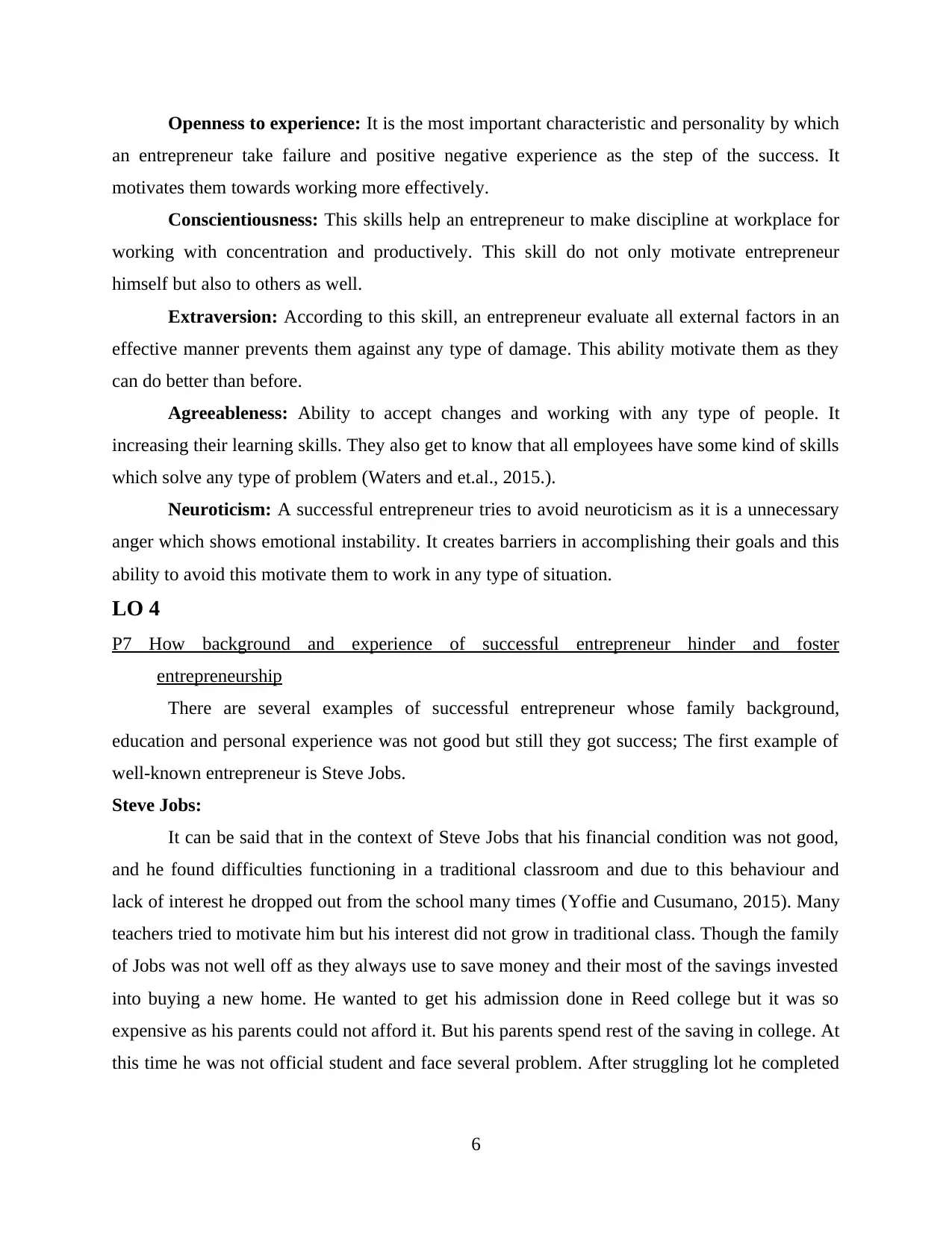
Openness to experience: It is the most important characteristic and personality by which
an entrepreneur take failure and positive negative experience as the step of the success. It
motivates them towards working more effectively.
Conscientiousness: This skills help an entrepreneur to make discipline at workplace for
working with concentration and productively. This skill do not only motivate entrepreneur
himself but also to others as well.
Extraversion: According to this skill, an entrepreneur evaluate all external factors in an
effective manner prevents them against any type of damage. This ability motivate them as they
can do better than before.
Agreeableness: Ability to accept changes and working with any type of people. It
increasing their learning skills. They also get to know that all employees have some kind of skills
which solve any type of problem (Waters and et.al., 2015.).
Neuroticism: A successful entrepreneur tries to avoid neuroticism as it is a unnecessary
anger which shows emotional instability. It creates barriers in accomplishing their goals and this
ability to avoid this motivate them to work in any type of situation.
LO 4
P7 How background and experience of successful entrepreneur hinder and foster
entrepreneurship
There are several examples of successful entrepreneur whose family background,
education and personal experience was not good but still they got success; The first example of
well-known entrepreneur is Steve Jobs.
Steve Jobs:
It can be said that in the context of Steve Jobs that his financial condition was not good,
and he found difficulties functioning in a traditional classroom and due to this behaviour and
lack of interest he dropped out from the school many times (Yoffie and Cusumano, 2015). Many
teachers tried to motivate him but his interest did not grow in traditional class. Though the family
of Jobs was not well off as they always use to save money and their most of the savings invested
into buying a new home. He wanted to get his admission done in Reed college but it was so
expensive as his parents could not afford it. But his parents spend rest of the saving in college. At
this time he was not official student and face several problem. After struggling lot he completed
6
an entrepreneur take failure and positive negative experience as the step of the success. It
motivates them towards working more effectively.
Conscientiousness: This skills help an entrepreneur to make discipline at workplace for
working with concentration and productively. This skill do not only motivate entrepreneur
himself but also to others as well.
Extraversion: According to this skill, an entrepreneur evaluate all external factors in an
effective manner prevents them against any type of damage. This ability motivate them as they
can do better than before.
Agreeableness: Ability to accept changes and working with any type of people. It
increasing their learning skills. They also get to know that all employees have some kind of skills
which solve any type of problem (Waters and et.al., 2015.).
Neuroticism: A successful entrepreneur tries to avoid neuroticism as it is a unnecessary
anger which shows emotional instability. It creates barriers in accomplishing their goals and this
ability to avoid this motivate them to work in any type of situation.
LO 4
P7 How background and experience of successful entrepreneur hinder and foster
entrepreneurship
There are several examples of successful entrepreneur whose family background,
education and personal experience was not good but still they got success; The first example of
well-known entrepreneur is Steve Jobs.
Steve Jobs:
It can be said that in the context of Steve Jobs that his financial condition was not good,
and he found difficulties functioning in a traditional classroom and due to this behaviour and
lack of interest he dropped out from the school many times (Yoffie and Cusumano, 2015). Many
teachers tried to motivate him but his interest did not grow in traditional class. Though the family
of Jobs was not well off as they always use to save money and their most of the savings invested
into buying a new home. He wanted to get his admission done in Reed college but it was so
expensive as his parents could not afford it. But his parents spend rest of the saving in college. At
this time he was not official student and face several problem. After struggling lot he completed
6

the basic design of the Apple and gradually he got success. So, it can be said that after having
poor financial condition, Steve Jobs got success.
Peter Jones:
Peter Jones also belongs from small town. His family education and financial background
was not strong and sound. His father was an air conditioner engineer who works for not making
money as for feeding his family. With lack of money Peter started his business and face several
problems but still he became a successful entrepreneur in the world. He is now known as British
businessman, entrepreneur and reality television personality (Jacobson and et.al., 2015). In this
context it can be said that family background does not affect an individual who have great
employability skills. In this example, it can be said that after having a poor and ineffective
background, Peter Jones makes an effective growth because he had several skills.
CONCLUSION
From the above study it has been summarized that entrepreneurial skills like innovation,
creativity, willingness to learn played a vital role in accomplishing goals. It has also shown the
importance of small and micro businesses that generate the economy of the UK. It has also
shown that passion and willingness make an individual success and make them able to get
success in any type of situations.
7
poor financial condition, Steve Jobs got success.
Peter Jones:
Peter Jones also belongs from small town. His family education and financial background
was not strong and sound. His father was an air conditioner engineer who works for not making
money as for feeding his family. With lack of money Peter started his business and face several
problems but still he became a successful entrepreneur in the world. He is now known as British
businessman, entrepreneur and reality television personality (Jacobson and et.al., 2015). In this
context it can be said that family background does not affect an individual who have great
employability skills. In this example, it can be said that after having a poor and ineffective
background, Peter Jones makes an effective growth because he had several skills.
CONCLUSION
From the above study it has been summarized that entrepreneurial skills like innovation,
creativity, willingness to learn played a vital role in accomplishing goals. It has also shown the
importance of small and micro businesses that generate the economy of the UK. It has also
shown that passion and willingness make an individual success and make them able to get
success in any type of situations.
7
⊘ This is a preview!⊘
Do you want full access?
Subscribe today to unlock all pages.

Trusted by 1+ million students worldwide
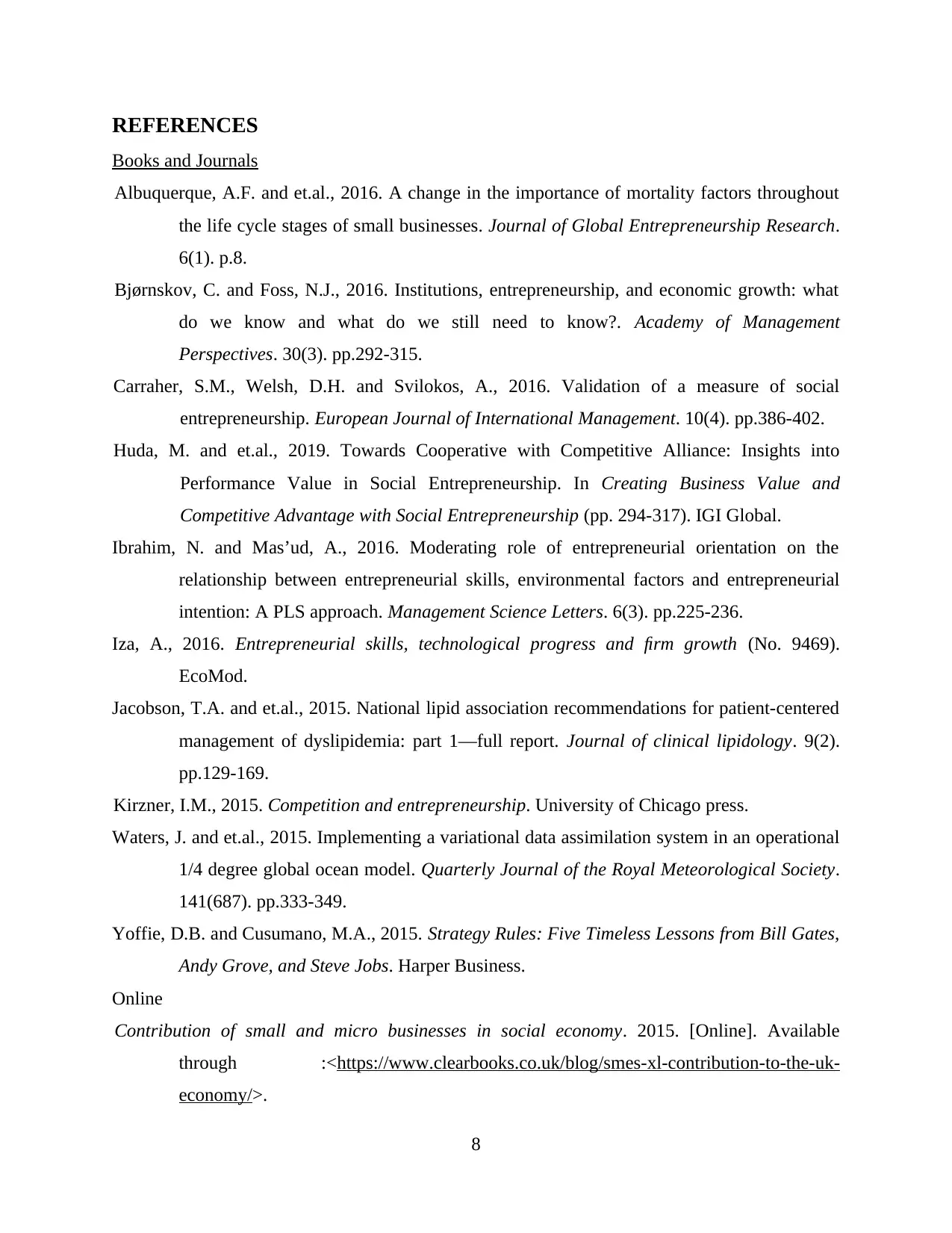
REFERENCES
Books and Journals
Albuquerque, A.F. and et.al., 2016. A change in the importance of mortality factors throughout
the life cycle stages of small businesses. Journal of Global Entrepreneurship Research.
6(1). p.8.
Bjørnskov, C. and Foss, N.J., 2016. Institutions, entrepreneurship, and economic growth: what
do we know and what do we still need to know?. Academy of Management
Perspectives. 30(3). pp.292-315.
Carraher, S.M., Welsh, D.H. and Svilokos, A., 2016. Validation of a measure of social
entrepreneurship. European Journal of International Management. 10(4). pp.386-402.
Huda, M. and et.al., 2019. Towards Cooperative with Competitive Alliance: Insights into
Performance Value in Social Entrepreneurship. In Creating Business Value and
Competitive Advantage with Social Entrepreneurship (pp. 294-317). IGI Global.
Ibrahim, N. and Mas’ud, A., 2016. Moderating role of entrepreneurial orientation on the
relationship between entrepreneurial skills, environmental factors and entrepreneurial
intention: A PLS approach. Management Science Letters. 6(3). pp.225-236.
Iza, A., 2016. Entrepreneurial skills, technological progress and firm growth (No. 9469).
EcoMod.
Jacobson, T.A. and et.al., 2015. National lipid association recommendations for patient-centered
management of dyslipidemia: part 1—full report. Journal of clinical lipidology. 9(2).
pp.129-169.
Kirzner, I.M., 2015. Competition and entrepreneurship. University of Chicago press.
Waters, J. and et.al., 2015. Implementing a variational data assimilation system in an operational
1/4 degree global ocean model. Quarterly Journal of the Royal Meteorological Society.
141(687). pp.333-349.
Yoffie, D.B. and Cusumano, M.A., 2015. Strategy Rules: Five Timeless Lessons from Bill Gates,
Andy Grove, and Steve Jobs. Harper Business.
Online
Contribution of small and micro businesses in social economy. 2015. [Online]. Available
through :<https://www.clearbooks.co.uk/blog/smes-xl-contribution-to-the-uk-
economy/>.
8
Books and Journals
Albuquerque, A.F. and et.al., 2016. A change in the importance of mortality factors throughout
the life cycle stages of small businesses. Journal of Global Entrepreneurship Research.
6(1). p.8.
Bjørnskov, C. and Foss, N.J., 2016. Institutions, entrepreneurship, and economic growth: what
do we know and what do we still need to know?. Academy of Management
Perspectives. 30(3). pp.292-315.
Carraher, S.M., Welsh, D.H. and Svilokos, A., 2016. Validation of a measure of social
entrepreneurship. European Journal of International Management. 10(4). pp.386-402.
Huda, M. and et.al., 2019. Towards Cooperative with Competitive Alliance: Insights into
Performance Value in Social Entrepreneurship. In Creating Business Value and
Competitive Advantage with Social Entrepreneurship (pp. 294-317). IGI Global.
Ibrahim, N. and Mas’ud, A., 2016. Moderating role of entrepreneurial orientation on the
relationship between entrepreneurial skills, environmental factors and entrepreneurial
intention: A PLS approach. Management Science Letters. 6(3). pp.225-236.
Iza, A., 2016. Entrepreneurial skills, technological progress and firm growth (No. 9469).
EcoMod.
Jacobson, T.A. and et.al., 2015. National lipid association recommendations for patient-centered
management of dyslipidemia: part 1—full report. Journal of clinical lipidology. 9(2).
pp.129-169.
Kirzner, I.M., 2015. Competition and entrepreneurship. University of Chicago press.
Waters, J. and et.al., 2015. Implementing a variational data assimilation system in an operational
1/4 degree global ocean model. Quarterly Journal of the Royal Meteorological Society.
141(687). pp.333-349.
Yoffie, D.B. and Cusumano, M.A., 2015. Strategy Rules: Five Timeless Lessons from Bill Gates,
Andy Grove, and Steve Jobs. Harper Business.
Online
Contribution of small and micro businesses in social economy. 2015. [Online]. Available
through :<https://www.clearbooks.co.uk/blog/smes-xl-contribution-to-the-uk-
economy/>.
8
Paraphrase This Document
Need a fresh take? Get an instant paraphrase of this document with our AI Paraphraser

9

10
⊘ This is a preview!⊘
Do you want full access?
Subscribe today to unlock all pages.

Trusted by 1+ million students worldwide
1 out of 15
Related Documents
Your All-in-One AI-Powered Toolkit for Academic Success.
+13062052269
info@desklib.com
Available 24*7 on WhatsApp / Email
![[object Object]](/_next/static/media/star-bottom.7253800d.svg)
Unlock your academic potential
Copyright © 2020–2025 A2Z Services. All Rights Reserved. Developed and managed by ZUCOL.





